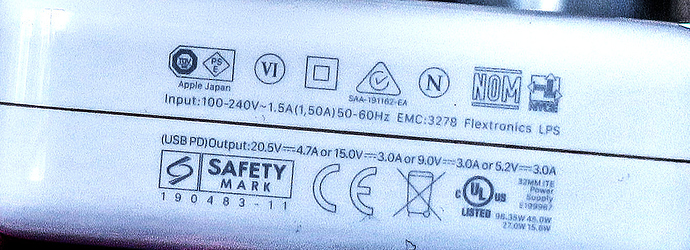My new Fairphone3 is designed to charge with a version QC 3.0 compatible charger with Output: 5.0V 𝌂 3.0A/9.0V 𝌂 2.0A/12.0V 𝌂 1.5A 18.0W MAX.
I have a 65W laptop charger Output: 20V𝌂 3.25A/15V 𝌂 3.0A/9.0V 𝌂 2.0A/5V 𝌂 2A. Is it safe to use it?
(the laptop charger is the only charger I have with USB-C)
Looks like a match. 9x2=18W
The laptop charger likely uses the USB PD protocol instead of QC 3.0, meaning it won’t do 9V but should charge at 5V. It’s safe to connect it.
I have this kind of laptop charger : Apple Adaptateur secteur USB-C 96 W.
Do you think it’s gonna work too? Thx
This topic was automatically closed 180 days after the last reply. New replies are no longer allowed.
Pretty surprising for me finding this post about someone else using his mobile computer’s power supply for his mobile having USB-C.
Yes, sure USB-C had a bad start with many incompatibilities and devices busting into flames or at least melting power sockets frying devices. Things got a bit better meanwhile.
The initial idea of USB-C was to even have a higher universality and compatibility than with µUSB. But there are always scammers simply gluing together some left over parts and selling them. Some of them even come from Asia  .
.
If it’s not from the Fruit company but from another manufacturer caring about broadly more common official standards it’s absolutely save to use an available “certified” USB-C charger for whatever device having the same socket type.
If it’s for home use surely any proper charger (speaking of fixed cables like for notebooks) should work fine unless one manufacturer did not care about the official standard.
It’s different with cordless chargers as the cable also can make a difference if charging will work properly or not.
I will also start off with my 65 watts Lenovo psu for my FP4.
Somehow the wrong logic persists among many users believing that a charging unit listed with a higher current value will blow a connected device. According to electrical rules and physical laws, generally spoken - it’s the voltage pushing current through any device. Current it the consequence of voltage. No current without voltage (neglecting L | C elements). Usually it’s the voltage that has to match, not the current.
If there is more intelligence involved like in USB-C there’s some type of negotiation between the charger and the end device. If there’s no proper negotiation achieved the lowest or no charging level will be established. Of course this process only works securely if both partners (+ cable) are based on standardized designs.
Apple chargers tend to be compatible with devices of other brands nowadays so I don’t expect much trouble.
It’s a USB PD charger, so likely no ‘fast charging’ on the FP3 as it doesn’t support this protocol, but normal charging should work (at most 5V * 2.4A = 12W; the phone will refuse to draw more power if there is no QuickCharge-compatible charger detected.)
It looks like the FP4 might support USB PD, allowing fast charging from a laptop charger.
This topic was automatically closed 90 days after the last reply. New replies are no longer allowed.
